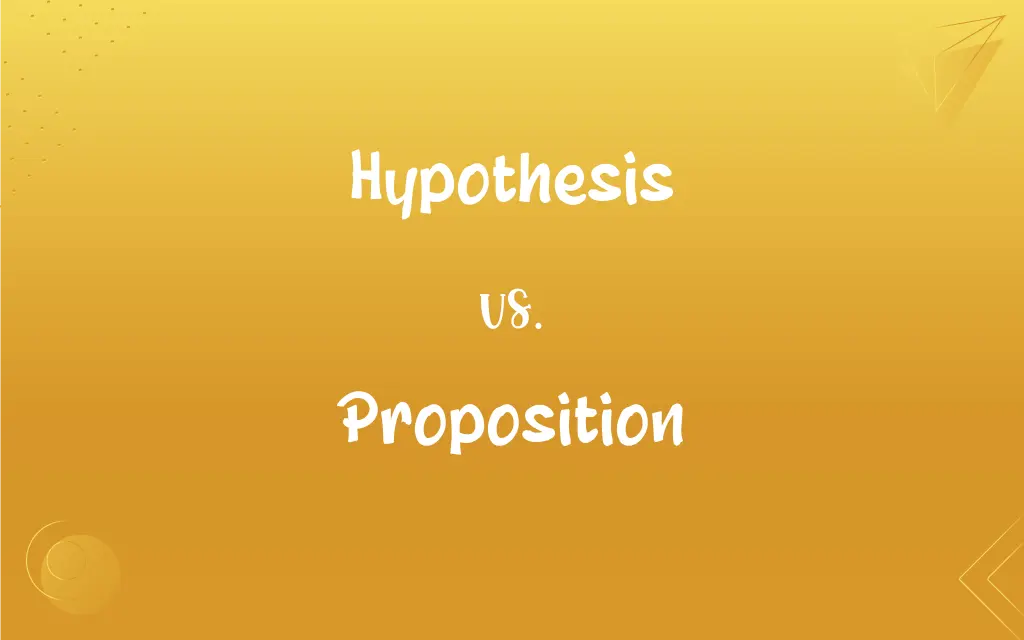Hypothesis vs. Proposition: What's the Difference?
Edited by Janet White || By Harlon Moss || Updated on November 7, 2023
A hypothesis is a testable assumption for further investigation, whereas a proposition is a suggested scheme or plan.

Key Differences
A hypothesis is a foundational element of scientific inquiry, posited as a tentative explanation or prediction that can be tested through observation and experimentation. A proposition, on the other hand, is a statement or assertion that expresses a judgment or opinion.
Hypotheses are often used in the realm of research and can be either supported or refuted by data. Propositions are more commonly found in logic and philosophy, outlining a condition that can be either true or false but is not necessarily subject to empirical testing.
The formulation of a hypothesis is a critical step in the scientific method as it guides the direction of study and analysis. In contrast, a proposition serves as a premise in a logical argument or a proposal in a business context.
Hypotheses are dynamic; they evolve as new evidence is presented and can be modified or discarded. Propositions, while they can be debated and discussed, typically represent a more static statement or idea.
In academia, a hypothesis is associated with theses and research proposals, reflecting a concept that may have implications for theory or practice. Propositions are often used to convey concepts in philosophical arguments or to propose actions within strategic plans.
ADVERTISEMENT
Comparison Chart
Definition
A speculative statement to be tested
A statement or plan put forth for consideration
Function
To be tested and verified
To be considered or accepted
Usage in Text
Used in scientific and academic contexts
Used in logical, philosophical, or business contexts
Nature
Empirical and often provisional
Conceptual and can be argumentative
Outcome
Leads to confirmation, modification, or refutation
Leads to agreement, implementation, or rejection
ADVERTISEMENT
Hypothesis and Proposition Definitions
Hypothesis
A hypothesis is a theory requiring investigation.
His hypothesis about the correlation between diet and health is gaining acceptance.
Proposition
A proposition is a suggested plan or scheme.
The committee put forward a proposition for a new charity event.
Hypothesis
A hypothesis is a proposed explanation for a phenomenon.
The hypothesis that increased sunlight boosts plant growth can be tested in a controlled experiment.
Proposition
A proposition is a plan suggested for acceptance.
The proposition to merge the two departments was carefully considered by the board.
Hypothesis
A hypothesis is a prediction based on limited evidence as a starting point for further investigation.
Her hypothesis that stress affects blood pressure was confirmed by recent studies.
Proposition
A proposition is a statement expressing a judgment or opinion.
The proposition that the company should expand overseas was met with approval.
Hypothesis
A hypothesis is a supposition or proposed explanation made on the basis of limited evidence.
The scientist’s hypothesis was that the substance would change color when heated.
Proposition
A proposition is an idea put forth for consideration.
His proposition was that the workday should start later.
Hypothesis
A hypothesis is a conjecture put forward as a basis for reasoning.
The student’s hypothesis was that sleep improves memory retention.
Proposition
A proposition is a subject presented for discussion or analysis.
The proposition of free public transport was debated at the town meeting.
Hypothesis
A tentative explanation for an observation, phenomenon, or scientific problem that can be tested by further investigation.
Proposition
A plan suggested for acceptance; a proposal.
Hypothesis
Something taken to be true for the purpose of argument or investigation; an assumption.
Proposition
A matter to be dealt with; a task
Finding affordable housing can be a difficult proposition.
Hypothesis
The antecedent of a conditional statement.
Hypothesis
(sciences) Used loosely, a tentative conjecture explaining an observation, phenomenon or scientific problem that can be tested by further observation, investigation and/or experimentation. As a scientific term of art, see the attached quotation. Compare to theory, and quotation given there.
Hypothesis
(general) An assumption taken to be true for the purpose of argument or investigation.
Hypothesis
(grammar) The antecedent of a conditional statement.
Hypothesis
A supposition; a proposition or principle which is supposed or taken for granted, in order to draw a conclusion or inference for proof of the point in question; something not proved, but assumed for the purpose of argument, or to account for a fact or an occurrence; as, the hypothesis that head winds detain an overdue steamer.
An hypothesis being a mere supposition, there are no other limits to hypotheses than those of the human imagination.
Hypothesis
A tentative theory or supposition provisionally adopted to explain certain facts, and to guide in the investigation of others; hence, frequently called a working hypothesis.
Hypothesis
A proposal intended to explain certain facts or observations
Hypothesis
A tentative theory about the natural world; a concept that is not yet verified but that if true would explain certain facts or phenomena;
A scientific hypothesis that survives experimental testing becomes a scientific theory
He proposed a fresh theory of alkalis that later was accepted in chemical practices
Hypothesis
A message expressing an opinion based on incomplete evidence
FAQs
How is a hypothesis used?
It is used primarily in scientific research to predict an outcome that can be tested through experiments and observations.
Can a hypothesis change?
Yes, hypotheses can be modified or discarded based on experimental results and new evidence.
Can a hypothesis be proven?
A hypothesis can be supported or refuted by evidence but is not proven in an absolute sense as it remains open to re-evaluation with new data.
What is a proposition?
A proposition is a statement or plan proposed for consideration, often in a logical argument or as a suggested course of action.
Can a proposition be false?
Yes, propositions can be true or false, and their validity is often subject to logical analysis or practical outcomes.
What is a hypothesis?
A hypothesis is a testable prediction or explanation made on the basis of limited evidence as a starting point for further investigation.
Are propositions debatable?
Yes, propositions are often debated, especially in philosophical and logical contexts, as they present ideas or plans for consideration.
Is a hypothesis always scientific?
While commonly used in science, hypotheses can be formulated in any area of inquiry that allows for systematic investigation and testing.
How are propositions validated?
Propositions are validated through logical argumentation, practical implementation, and sometimes through societal or community acceptance.
Are hypotheses and propositions interchangeable?
No, they serve different purposes; hypotheses are meant for testing, while propositions are for suggesting or asserting ideas.
Do propositions have to be actionable?
While many propositions suggest a plan of action, others simply present a statement or idea to be considered.
Are all propositions formal?
Propositions vary in formality from formal declarations to informal suggestions.
Who uses propositions?
Propositions are used by philosophers, logicians, business strategists, and anyone needing to present a plan or idea.
Can a proposition be a question?
While a proposition itself is not a question, it can be phrased as a rhetorical question in argumentation or debate.
Must a hypothesis be original?
A hypothesis does not have to be original but should offer a novel insight or prediction about the subject under investigation.
Can propositions be tested?
Some propositions can be tested or implemented, while others serve as principles that are accepted or rejected based on logical or ethical grounds.
Is a hypothesis always a single statement?
A hypothesis is typically expressed as a single statement, but complex hypotheses can consist of multiple related predictions.
Is a hypothesis a question?
A hypothesis is not a question but rather a statement that implies a question about the relationship between variables.
Can a hypothesis become a theory?
Yes, a hypothesis can become a theory if it is repeatedly validated by evidence and gains widespread acceptance.
How specific does a hypothesis need to be?
A hypothesis should be sufficiently specific to allow for clear testing and validation methods.
About Author
Written by
Harlon MossHarlon is a seasoned quality moderator and accomplished content writer for Difference Wiki. An alumnus of the prestigious University of California, he earned his degree in Computer Science. Leveraging his academic background, Harlon brings a meticulous and informed perspective to his work, ensuring content accuracy and excellence.
Edited by
Janet WhiteJanet White has been an esteemed writer and blogger for Difference Wiki. Holding a Master's degree in Science and Medical Journalism from the prestigious Boston University, she has consistently demonstrated her expertise and passion for her field. When she's not immersed in her work, Janet relishes her time exercising, delving into a good book, and cherishing moments with friends and family.






































































